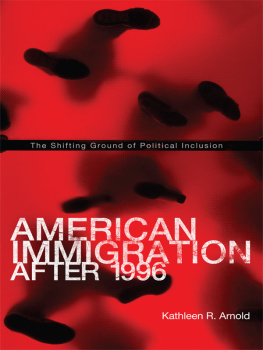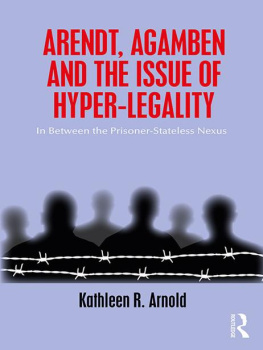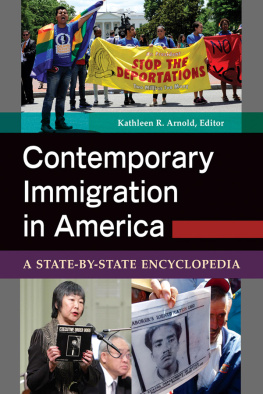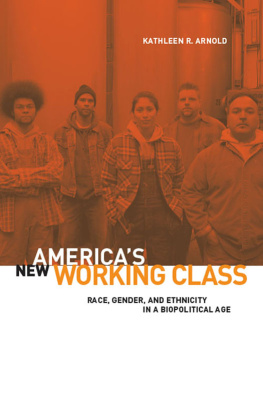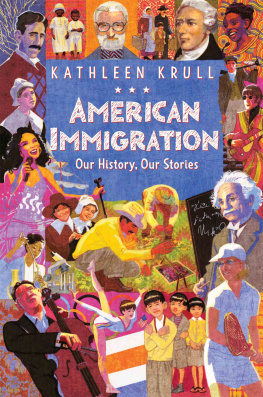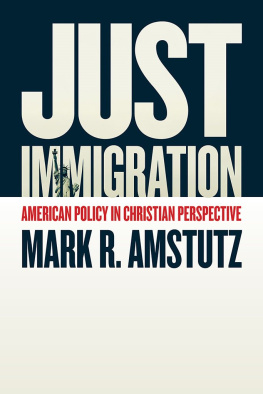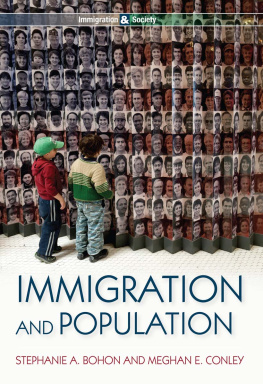were previously published in
Enemy Invaders! Mexican Immigrants and U.S. Wars Against
Them, Borderlands 6, no. 3 (December 2007),
http://www.borderlands.net.au/.
is an expanded version of a paper first published
as Economic Prerogative and Its Political Consequences,
Constellations 18, no. 4 (2011).
Library of Congress Cataloging-in-Publication Data
Arnold, Kathleen R., 1966
American immigration after 1996 : the shifting ground of
political inclusion / Kathleen R. Arnold.
p. cm.
Includes bibliographical references and index.
Summary: Examines the underlying complexities of immigration
in the United States and the relationship between globalization
of the economy and issues of political sovereigntyProvided by publisher.
ISBN 978-0-271-04889-5 (cloth : alk. paper)
1. United StatesEmigration and immigration.
2. ImmigrantsUnited StatesSocial conditions.
3. ImmigrantsCivil rightsUnited States.
I. Title.
JV6465.A76 2011
304.873dc22
2011008010
Copyright 2011 The Pennsylvania State University
All rights reserved
Printed in the United States of America
Published by The Pennsylvania State University Press,
University Park, PA 16802-1003
The Pennsylvania State University Press is a member of the
Association of American University Presses.
It is the policy of The Pennsylvania State University Press to
use acid-free paper. Publications on uncoated stock satisfy
the minimum requirements of American National Standard
for Information SciencesPermanence of Paper for Printed
Library Material, ANSI z 39.481992.
This book is printer on Natures Natural, which contains 50% post-consumer waste.
For DAD AND GAYAN;
THANKS FOR YOUR SUPPORT AND LOVE
Although I was particularly motivated to write these chapters during the widespread backlash against immigration between 2006 and 2008, this book was also inspired by my personal experiences with immigration (living and working abroad), as well as by numerous experiences with immigrants as friends and coworkers in the United States. My ideas on immigration were also greatly aided when I first taught a course on immigration at Harvard University. I would like to thank the students of those seminarsparticularly the first one I taughtfor their enthusiasm and suggestions. The anonymous committee that oversaw and chose the course was also very helpful and suggested some works that are crucial to my discussion in this book. Although I now work in relative isolation, the discussions I had with Nicholas Xenos about the course and my earlier work on immigration were invaluable, as always. I continue to teach a similar course on immigration and have learned quite a lot from my students in Texas. In addition, audiences and panels at conferences where I presented these chaptersincluding the Western Political Science Association Meetings of 2008 and 2009 and the Lonestar Theory Workshop of 2009were also very helpful.
I want to thank Sandy Thatcher, who is truly a great editor. Sandy is open to new approaches and interdisciplinary work, and I am grateful for his suggestions and enthusiasm for this project. I would also like to thank James Martel, Sheila Croucher, and a third, anonymous reviewer for their engagement with my arguments and their very constructive comments. In addition, my friend Karuna Mantena gave me critical feedback on the chapter on guest workers and the maquila program at a crucial timeI really appreciate the help. Finally, I would like to thank Borderlands for permission to reprint an earlier version of
On a personal level, I would like to thank my friends Jonathan Bernstein, Joshua Dienstag, Ashley Daz, Patricia Jaramillo, Amy Jasperson, Karuna Mantena (again), and Kimberly Sims, as well as my mother, Kathy, for their support during a difficult period. My daughter, Hannah, continues to make single motherhood joyful and exiting. I am dedicating this book to my father, Tony, and his wife, Gayan, whose support for my work and personal life I truly appreciate.
In the two years preceding the 2008 presidential election, immigration became a hot topic of public discussion for the first time since the mid-1990s. however, the problem is narrowly construed.
It seems that the debates on immigration in the new millennium have left people in two camps. On the one hand, proponents of immigration argue that the United States should continue to allow immigrants to enter because they are necessary for the workforce. This group is bipartisan and sees immigration as necessary for the low-tier labor market and to maintain American allow for new power dynamics that will ensure that immigrants rights and political needs cannot be met by the nation-state.
The continued merging of immigration policy with anti-terror provisions has led to increased arrests of immigrants, harsh treatment of unauthorized entrants, and charges of , leaving them vulnerable in a new way.
Although the United States receives an incredibly diverse group of immigrants and asylum claimants, the perception of an immigration problem is mainly focused on Mexicans and Mexican Americans. Both groups have been charged with stealing jobs, being parasites, overcrowding housing, having too many children, burdening public welfare, and lacking restraint. But these feelings and stereotypes have far more to do with U.S. political and economic issues than with issues in the particular immigrant community. Essentially, they symbolize all the United States present concerns: the loss of a social safety net, a crisis in health care, a faltering economy, and the threat of terrorism.
In particular, it is alleged that Mexicans do not assimilate, that they want to use the United States for services or to send remittances home but are not loyal to this country, and that they are a major drain on welfare. But in the context of the war on terror (and related wars), Mexicans presence is viewed as not merely an economic threat but also a sovereign onethis is a key difference from the perception of the Irish in the mid-1800s. Nevertheless, the United States desire to remain competitive in the international market ensures that Mexicans are never denied access to this country. Rather, the goal is to facilitate economic exploitability through increased surveillance and control.
Although there is a significant amount of literature on immigrationissuing from the backlash against immigration in the 1990s
In this book, I examine the monolithic images that can be found in public policy, opinion, and recent debates (all of which Michel Foucault would broadly term discourse), rather than looking at the target populations (Mexicans, as well as individuals from Central and South America, the Caribbean, and those of Arab/Middle Eastern/Islamic descent or belief ) in terms of their culture and their assimilability. In the spirit of
More specifically, I believe that few conventional analyses of immigration have fully accounted for the linkage between the alongside the transmogrification of state power (rather than its increasing absence). It is for this reason that U.S. policies and mainstream debates, including conventional scholarly analyses, are too narrow and outdated.
As discussed above, recent proposals for immigration policy reform have suggested that there are only two possible solutions to the alleged problem of immigration and unauthorized entry: either enlarge the
What makes these workers political status ambivalent and thus precarious is the politically undecidable character of their lives. The status of Mexican immigrants today is transnational in at least three ways: First, there is a great deal of crossing the southern border, accompanied by mixed allegiances.

